

Lloyd (Respondent) v Google LLC (Appellant) Case ID: UKSC 2019/0213 Case summary Issue.

Landmark Case Opens the Door to UK Data Protection Consumer Class Actions. Lloyd v google judgment. Google.finaldraftjudgment.approved 2 10 19. Lloyd v google judgment. Google v vidal hall judgment. Lloyd (Respondent) v Google LLC (Appellant) Lloyd-v-google-judgment. Supreme Court to consider collective action for "loss of control" of personal data. Google hit with new biometric data privacy class action similar to one previously dismissed. On the heels of a proposed $550 million settlement that Facebook recently agreed to settle lawsuits under the controversial Illinois Biometric Information Privacy Act (BIPA), a deal which is still subject to the approval of U.S.
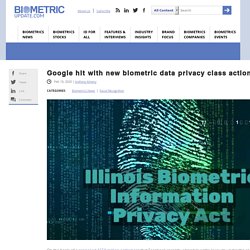
District Judge James Donato of the United States District Court Northern District Of California, Google was being served with a class-action lawsuit alleging it, too, has violated BIPA. “The amount in controversy exceeds $5 million exclusive of interest and costs … for damages and other legal and equitable remedies resulting from the illegal actions of Google in collecting, storing, and using the Plaintiff’s and other similarly-situated individuals’ biometric identifiers and biometric information without informed written consent, in direct violation of BIPA,” the class action suit alleges.
At the same time, Google was being slammed with the class action suit in the same Federal District Court, U.S. Amp.theguardian. UK class action accuses Google of unlawfully harvesting personal data. £3bn Google sueball over Safari Workaround bounces through UK Court of Appeal. Judgment was handed down today at the Royal Courts of Justice in London Google has lost its attempt to squash a High Court lawsuit that could see the firm stung for £3bn over its exploitation of a loophole in Apple's Safari browser.
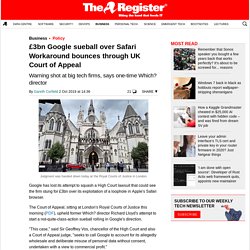
The Court of Appeal, sitting at London's Royal Courts of Justice this morning (PDF), upheld former Which? Director Richard Lloyd's attempt to start a not-quite-class-action sueball rolling in Google's direction. Www.thejournal. £3 billion Safari iPhone privacy lawsuit given go-ahead. A UK class action privacy lawsuit against Google can go ahead, according to the UK Court of Appeal.

The suit claims up to £3bn ($3.9bn) in damages based on Google’s manipulation of Apple’s Safari browser in 2011-12. In 2010, Apple included anti-tracking technology in Safari that would stop advertising companies from inserting cookies into the browser. Case Preview: Lloyd v Google, UK Supreme Court to decide on representative data protection action – Emily Cox – Inforrm's Blog. On Wednesday 28 April and Thursday 29 April 2021, the UK Supreme Court will hear Lloyd v Google LLC, a hotly anticipated appeal which could see the rebirth of the CPR 19.6 representative claim vehicle for opt-out data privacy ‘class actions’.
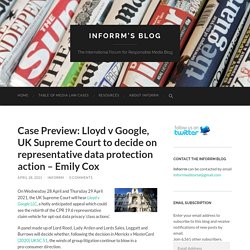
A panel made up of Lord Reed, Lady Arden and Lords Sales, Leggatt and Burrows will decide whether, following the decision in Merricks v MasterCard [2020] UKSC 51, the winds of group litigation continue to blow in a pro-consumer direction. Background In May 2017 Richard Lloyd, a former Executive Director of Which? Google could be forced to pay £2.7 billion in compensation to iPhone users
Green-light-for-thousands-of-ba-customers-to-make-compensation-claim-a4254696. Thousands of British Airways customers have been given the green light to to bring compensation claims against the airline over a data breach.

Half a million people were left exposed by the cyber attack on BA's systems last year last year and BA could face a record fine for their “poor security arrangements”. At a hearing at the High Court in London, Mr Justice Warby granted a group litigation order, paving the way for a mass legal action. Personal details, including payment data and addresses, were compromised by the hack, according to the Information Commissioner's Office.
Part of the scam involved passengers being diverted to a fake website, through which their details were harvested by the attackers. The airline informed the ICO and began to contact affected customers when it discovered the breach in September 2018. Www.businessupnorth.co. North West based data breach and cybersecurity specialist Hayes Connor Solicitors is the first in the UK to serve a representative data breach claim in the High Court.

The action could see Equifax ordered to pay up to £100 million in compensation to its estimated 15 million UK customers affected by its 2017 data breach. The action follows the Court of Appeal’s decision on the Lloyd v Google case on 2nd October which ruled that a law firm could bring a claim for compensation for just one affected individual following a data breach and be awarded compensation for the entire affected population. Judge rules Google has to face lawsuit that claims it tracks users even in Incognito mode.
A judge in California ruled Friday that Google has to face a class action lawsuit that claims the search giant secretly collects data from users even when they’re using its private “Incognito” mode, Bloomberg reported.
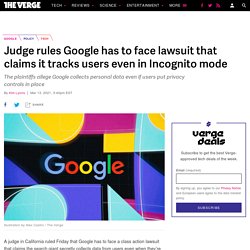
Three users filed a complaint last June alleging Google has a “pervasive data tracking business,” and its tracking persists even if users take steps to protect their private information, such as using incognito mode in Chrome, or private browsing in Safari and other browsers. The lawsuit seeks at least $5 billion. Google had sought to have the case thrown out, but US District Judge Lucy Koh wrote in her ruling that the company “did not notify users that Google engages in the alleged data collection while the user is in private browsing mode.” Google spokesperson José Castañeda said in an email to The Verge on Saturday that the company disputes the lawsuit’s claims “and we will defend ourselves vigorously against them.” Awarding damages for emotional harm.
Under the Privacy Act, the Human Rights Review Tribunal (“the Tribunal”) can award damages for emotional harm caused by a privacy breach.
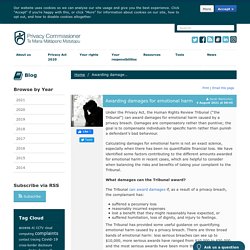
Damages are compensatory rather than punitive; the goal is to compensate individuals for specific harm rather than punish a defendant’s bad behaviour. Calculating damages for emotional harm is not an exact science, especially when there has been no quantifiable financial loss. Courts and Tribunals Judiciary. Judge allows class-action lawsuit against Google to proceed.
A judge in California ruled that Google must face a class-action lawsuit claiming the technology conglomerate continued to gather data from users who used "incognito" mode on the Chrome browser.
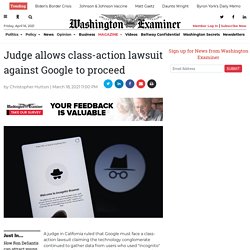
There have been questions about how much data the tech giant collects from users through advertisements, cookies, and other data collection services. Google offered incognito mode as an option in the Chrome browser.